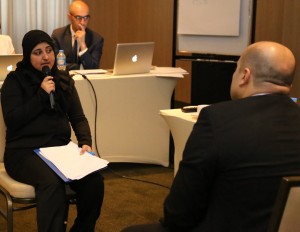Written by Banaz Taha
On 21st October MERI hosted a workshop on quality assurance in law enforcement as part of a series of training sessions provided to police officers from special units for combating violence against women.
Twenty-one police officers and their captains from Qala and Minara police stations in Erbil, as well as the chief of Erbil Directorate, legal experts and representatives from the Ministry of Interior of the Kurdistan Region attended this workshop, which also marked the initiation of the implementation phase of MERI’s Prevention of Violence Against Women (PVAW) project.
The workshops and training sessions set out to promote an integrated approach to quality assurance in Kurdistan Region’s law enforcement. Their aim is to improve the quality of services provided to the public by adopting professional and transparent standards of policing and service delivery.
The objectives of the initiative are:
- to develop a quality assurance culture and mindset,
- to introduce feedback and appraisal mechanisms,
- to integrate quality assurance in policing with governance,
- to share examples of leading practices,
- to promote professional development.
This initiative will continue in 2015 by:
- providing training on quality assurance for special police units on VAW,
- organizing regional workshops to define quality assurance in law enforcement,
- hosting a conference on quality assurance and good governance,
- developing global dialogue and collaboration on case study reports,
- introducing best-practices for Kurdistan Region.
The Layout of the Workshop
During the workshop each attendant received a sample of a ‘staff portfolio’, which contained several evaluation forms. ‘It is the accurate and ongoing assessment of each police officer, their supervisors and the other members of staff, which leads to genuine improvement in the quality of services provided,’ Prof. Dlawer Ala’Aldeen emphasized. Furthermore he contended that, ‘this in turn, is the best means by which lack of trust in the justice system and law enforcement can be eradicated’.
The assessment is a top-down, horizontal and bottom-up process and is validated by individual staff portfolios containing Manager-, Peer-, and Employee evaluations. Most importantly, and at the heart of this process, the portfolio contains Client Satisfaction evaluations provided by the victims of domestic violence through feedback forms, made available to them at the police stations.
Review meetings between a staff member and his/her supervisor, and/or with the external and independent quality assurance manager (IQAM) will then follow to identify gaps. In addition, the meetings will lead to performance assessments that will translate into recommendations and possibly additional training. The use of IQAM is designed to guarantee transparency and accuracy, while fostering staff confidence and trust in the assessment process.
During the workshop the police officers became acquainted with the practical aspects of this quality assurance mechanism through an interactive exercise in which they had to evaluate their peers and their manager/Captain. The evaluation of the manager/Captain’s performance by an IQAM was demonstrated in a mock interview. The outcome of this interview was based on the feedback the Captain had received from her staff.
Institutionalising Quality Assurance
Quality assurance is a continuous and ongoing process. Therefore, to ensure further improvement and maintenance of high quality standards, a ‘Quality Assurance Database’ will be implemented at the General Directorate, which will regularly monitor and measure the quality of the work method, the outputs and outcomes of the individual staff members and offices. It shall be the responsibility of each line-manager then to consider recommendations and to address areas for improvement based on these outcomes.
“Commitment and ownership from all staff in all ranks is however, crucial for the elimination of deficiencies in the current system and to maintain a high standard after the implementation of the quality assurance policy by MERI,” it was concluded.
The workshop ended with a vibrant questions and answer session and feedback from the attendants on how to enrich the forthcoming workshops. From here on MERI will proceed with the implementation of the quality assurance policy and the development of the Database in coordination with the Ministry of Interior-KRG.
* * * * *
About MERI: The Middle East Research Institute is Iraq’s leading policy-research institute and think tank. It is an independent, entirely grant-funded not-for-profit organisation, based in Erbil, Kurdistan Region. Its mission is to contribute to the process of nation-building, state-building and democratisation via engagement, research, analysis and policy debates.
MERI’s main objectives include promoting and developing human rights, good governance, the rule of law and social and economic prosperity. MERI conduct high impact, high quality research (including purpose-based field work) and has published extensively in areas of: human rights, government reform, international politics, national security, ISIS, refugees, IDPs, minority rights (Christians, Yezidis, Turkmen, Shabaks, Sabi mandeans), Baghdad-Erbil relations, Hashd Al-Shabi, Peshmarga, violence against women, civil society. MERI engages policy- and decision-makers, the civil society and general public via publication, focused group discussions and conferences (MERI Forum).


